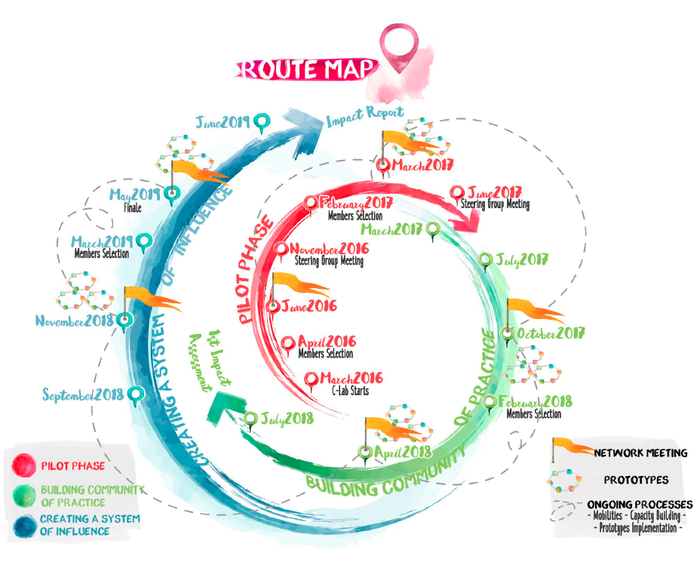After a quick and quiet train journey from Frankfurt Fernbahnhof to Brussels I walked from Gare du Nord in Brussels to the hotel. Serban (Asociatia Cicivus Romania) from Romania was the first person I met after checking in. He was waiting for his room to get ready. Francesco (Parliament Watch Italia) from Sicily (as he insisted on saying) was second, after him Marou (COMM'ON) from Greece whom I only knew from the conference call we did before the meeting. After that the lobby of the hotel quickly filled up with people. I knew about 30 of them from the kick-off meeting in Berlin and 20 newcomers were expected to join us in Brussels at the CitizensLab meeting.

Arrival to day 1 at CitizensLab meeting in Brussels and the venue which hosted us at day 3 (greenbizz.brussels).
I eventually went out with Cristian (Alba Iulia Municipality) from Romania to find some lunch. Outside we ran into Handan (Komsu Kapisi Macka Dayanisma Dernegi) from Turkey who was drifting about the city. Together we went on to have lunch in a Thai restaurant and a coffee afterwards at the Drugopera café. Afterwards we walked to the first venue of the meeting the KVS Theater. It was great to see Tunde (KVS Theater and Urban Woorden) again, who is city dramaturge at KVS Theater. If you are in Brussels, check out the KVS - it is an amazing place.
Afternoon session at the KVS
The afternoon session at KVS was dedicated to the networks's ecology and to our motivation to become part of CitizensLab. We were welcomed by Alice on behalf of the organizing team of MitOst. Maria Scordialos (Living Wholeness Institute) was to be our facilitator for the meeting in Brussels.
Triad-exercise - The speaker, the listener and the witness
In groups of three we talked about our motivation for the work we are doing - taking shifts being the speaker, the listener and the witness of the conversation. I was in a group with Kate (We Make Places) from UK and Sjoerd (Leeuwarden-Fryslan European Capital of Culture 2018) from The Netherlands. Each speaker had 10 minutes to explore what is his or her motivation for her work. The task of the listener is to listen attentively and - if needed - to ask questions to help the speaker to go deeper into the issue. The witness is making notes about the conversation between speaker and listener and provides a feedback to the speaker at the end of the excercise.

Sessions at the European Policy center
The program of the second day took place at the European Policy Center. Maria gave us an inspiring introduction to the lab approach and we became acquainted with the route map of CitizensLab.
The Lab Approach - how to achieve systemic change?
The lab approach involves working at the root level. As members of CitizensLab we want to impact on how we live and work in Europe. To have impact, we need to operate on a translocation level.
Unfortunately, systemic change can not be planned and determined. Part of systemic change is chaos. Chaos means constant movement and though it carries an element of order, this emerges rather than it is planned. Chaos is defined through multible relationships, it is complex and unpredictable.
The lab approach is about how to creat conditions for systemic change. There are 4 elements that define a lab: a shared longer term goal (1), a core group of people who "keep the fire alive" (2), a series of experiments or prototypes which allows the members to play, try out and learn together in real time (3) and which defines a "network or community of practice(s)" (4).
You are interested in systemic change? Louise from UK is working for Forum for the Future which is doing research into the conditions of systemic change. Louise is also active for Peckham Coal Line an community-led initiative that is aiming to create a new linear link park to connect Peckham's neighbourhoods.
You want more information about the CitizensLab network meeting in Brussels? Download the full report which has been provided by the MitOst team.

